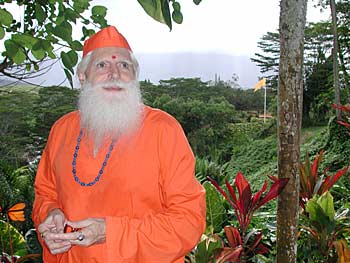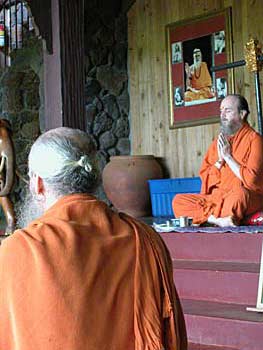Blog Archives

Today is our monthly “Ashram Sadhana” day and all the monks are out and about cleaning and working on various areas of the Aadheenam. Gurudeva says in “Living with Siva:”
“Cleaning the house is an act of purifying one’s immediate environment. Each piece of furniture, as well as the doorways and the walls, catches and holds the emanations of the human aura of each individual in the home, as well as each of its visitors. This residue must be wiped away through dusting and cleaning. This regular attentiveness keeps each room sparkling clean and actinic. Unless this is done, the rooms of the home become overpowering to the consciousness of the individuals who live within them as their auras pick up the old accumulated feelings of days gone by. Small wonder that a dirty room can depress you, and one freshly cleaned can invigorate. “
Our Beloved and Revered Satguru Sivaya Subramuniyaswami
Attained Maha Samadhi on November 12th, 2001
Click to read for Details.
Mystic Mouse Coloring Book Now available
Today’s sample page. —– Click here to get your copy today!

On ashram cleaning day the routine is usually to start by spending two hours cleaning the area that is normally cleaned only half-an-hour a day. This gives the monk a chance to do a more thorough job, make repairs or clean out a cupboard that he might not have time for on a daily basis.
Cybertalk: 2002 Kauai Innersearch Day 2, Part 3: Bodhinatha reviews the first two principles of Karma Management and proceeds with number 3, “forgive the offender” and number 4, “consider the consequences.” The first three principles have to do with the return of karma from past actions and how we respond to it; principles 4 and 5 deal with the creation of new karma.
Cybertalk Ends”
For more information about listening to Gurudeva’s talks online and to hear them in other formats, click here.
And click here for an Index to All Past CyberTalks.
Study Gurudeva’s teachings
every day. Visit the Master Course site!
Bodhinatha will be happy to hold “Prasnottara Satsang” — “Questions and Answers” over the telephone with any Hindu religious societies, Hindu youth groups, Radio talk show hosts etc. All you need is a phone with a speaker and an enthusiastic audience. Arrangements may be made in advance by sending email to Sadhaka Mahadevan
If you are experiencing any problems listening to the audio, please to go our Audio FAQ page for sound geeks and follow the directions there.
 |
|
|
 |
||
The next two hours of the morning are spent working on a special area, sometimes as a team, to upgrade some room or building. Each of the kulam has specific areas assigned to them… for example, the Pillaiyar Kulam will work on various areas of Kadavul Temple, and the Ganapati Kulam will clean outside in the gathering areas where the public comes.
In the afternoon each kulam goes to it’s work area, or office and cleans, organizes there for an hour or so.
Finally at the end of the day each monk takes an hour and works on his personal “Guha” or sleeping quarters, some of which are tucked away here and there in the jungle surrounding the Aadheenam main buildings.

|
Study Gurudeva’s teachings.
|
transcription begins
Date: June_12_2002
Title: Relation of Non-injury to Contentment
Category: Yamas and Niyamas
Duration: 8 min., 10 seconds
Date Given: May 13, 2002
Given by: Bodhinatha
Today, we are continuing on the yamas. The first yama we know, of course,
is non-injury, Ahimsa, not harming others by thought, word or deed.
Gurudeva points out that to practice ahimsa, we also have to practice the
niyama of Santosha, contentment.
A good illustration of this something you may have seen. You see a child
that is discontent, not really peaceful on the inside and so what is the
greatest joy? To make someone else discontent. Misery likes company.
There is a tendency to disturbs others if we ourselves are disturbed inside.
We don’t want to be alone. Therefore, the remedy that Gurudeva points out is
we need to be peaceful, we need to be content within ourselves. If we are
content within ourselves, then
the tendency to disturbs others is removed. No motivation, we would rather
see them content, in fact.
The philosophical basis for ahimsa begins with the understanding that the
Divine is within all things, all creatures, all people. When we have that
understanding, we don’t want to hurt someone else because we are obviously
hurting the Divine.
If we don’t see the Divine within someone, then it is much easier to hurt
them. We just think of them as a person. But if we see God within them,
then we certainly would not want to harm them.
The Hindu point of view is that the Divine is the essence of everyone. So,
even if people are acting in evil ways, even if people are criminals or
terrorists, the Divine is still there, it does not go away. Their intrinsic
nature is always good, even though they may act externally in inappropriate,
criminal and terrorist ways.
Sometimes, we run into the Western belief which does not look at it that
way, where we have good and evil. The forces of good and evil are at play
in the
world. We are the good guys and somebody else are the evil people.
Therefore, it is alright to treat the evil people differently than we treat
the good people because they are evil.
But of course, that is not the Hindu perspective. There is no good and evil
people because everyone is a divine being on the inside. So, even if people
are terrorists, it does not give us the right to harm them. The Kural has a
beautiful verse on that. It says, “Harming others even enemies who harmed
you unprovoked surely brings incessant sorrow.”
Even enemies who harmed us unprovoked, we cannot even harm them back. The
Tirukural won’t let us.
Of course, this doesn’t apply to the Armed Forces. We are not saying that
countries have to be pacifists or cannot have an Armed Forces that defends
it and so forth. The Armed Forces are under different rules. This is the
ordinary citizen. The person not in the Armed Forces, not in the Police
Department, how they should look at it. They shouldn’t harm people. There is
no justification, says the Tirukural, even if it is an enemy who harmed you
unprovoked.
Taking the philosophical perspective one step deeper. We start with seeing
the Divine within each, one so there is lots of divinities, right? We have
forty different divinities here this morning. But of course, as we know,
there is only one Divine being, one God, one spiritual consciousness. When
we look at our philosophical perspective in a deeper way, we see the
oneness, the spiritual oneness that ties everyone together with one
spiritual consciousness flowing through all.
There is a nice story on that, the story of Semmanaselvi. You remember the
old lady, that flooding river. They came and asked all the people in the
village to help build the dam, to keep the river from flooding the village.
She was too old to do it herself, so she hired a laborer to build the dam
for her. Of course, as we know the story, the laborer was constantly
misbehaving, sleeping when he should be working and dancing around, doing
everything wrong, not doing his share of the duty at all. Then, finally, the
King himself came up and hit the laborer with the cane because he was
misbehaving. Because the laborer was God Siva, every person in the world
felt that hit. Right, remember the story? Pointing out that God is within
everyone and therefore whatever happens to God, everyone feels.
We can also turn the story with a slightly different meaning. We can say we
are all tied together in a one consciousness and therefore whatever happens
to one person, happens to all people. So if one person is hit, all people
are hit. If I hit someone else, I am also hitting myself because we are all
tied together in a spiritual way.
Interesting to quote Albert Einstein in the middle of a Hindu talk but he
said something very profound that is related to this idea of everybody being
tied together in oneness. “A human being is a part of the whole called by
us, Universe, a part limited in time and space. He experiences himself, his
thoughts and feelings as something separated from the rest. A kind of
optical delusion of his consciousness. This delusion is a kind of prison
restricting us to our personal desires and to affection for a few persons
nearest to us. Our task must be to free from this prison by widening our
circle of compassion to embrace all living creatures and the whole nature in
its beauty.”
Isn’t that nice? You can see that circle just broadening and broadening and
broadening in terms of what we encompass.
transcription ends
|
MORE UPLIFTING THINGS |
Innersearch 2003-4 in India!
We just completed the July 17-23 Kauai Innersearch, 2002. Bodhinatha will lead the next Innersearch to India, between Dec 2003 and Jan 2004. We will visit Bangalore and the Iraivan Carving Village, and settle in the South in Tamil Nadu, Click on the above for details on what will be an inspiring journey to our holy land of Bharat! |
|

|
Check our children and youth section for new items for the young and young at heart! | |
|
1. SIGN OUR GUESTBOOK and receive a FREE GIFT |
||
| 2. Newest Book: LIVING WITH SIVA | ||
|
3. Visiting KAUAI’S HINDU MONASTERY |
||
|
4. Contribute to THANK YOU, GURUDEVA FUND |
||
From Our Gurus' Teachings
Archives are now available through 2001. Light colored days have no posts. 1998-2001 coming later.
